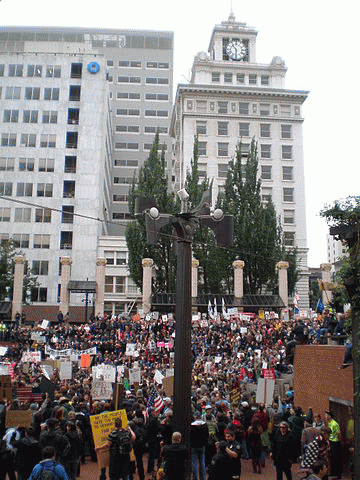I had the pleasure of getting a reply from Paul Pierson about his thoughts on OWS (Occupy Wall Street). He is the co-author of Winner-Take-All Politics with Jacob S. Hacker, and is a professor of political science at UC Berkeley. I extend my deepest condolences to his team in their recent defeat against Oregon. I also received a well-thought out answer to the question that has been plaguing this movement, does it have the organization to create real political change.
Walter Lippmann wrote, "[democracies] have in literal truth to lift themselves by their own bootstraps." The American democracy is a system built to allow people to access its potential at multiple points; a heavily redundant and overlapping structure to allow interests and citizens to be heard in many places. It is also a very slow system; resistant to change. It is a "maddening" system whereby the power of the few to block a majority is relatively easy; filibusters are probably the most prominent example.
Change comes slowly in America, and the key to making that change happen is good organization. Professor Paul Pierson said "the "1%" is organized, and in it for the long haul. It takes durable organization to effectively counter that, and this will be a huge challenge for citizens who, of course, face the strains of daily life, have many pressing demands on their time, and may lose faith in the absence of quick and obvious triumphs." The 1% has the upper hand by far right now. They have organized lobbies that have successfully defeated even the most modest bills since the 1970s. "Unions were on the front lines of every major economic battle of the mid-century." Unions were so powerful that distinguished voices like Derek Bok and John Dunlop were predicting a distinct shift toward the left.
But because of a well organized coalition of businesses (many of them initially small businesses) Unions suffered staggering defeats. Taking their new-found political might out for a drive, business started reframing the debate. In 1978 business successfully lobbied to lower the capital gains tax. For the next 20 years unions declined in membership and funding, the capital gains tax nearly disappeared, and voter turnout steadily decreased. It left a power vacuum of dedicated lobbyists that found a sympathetic ear in politicians willing to believe in trickle-down policy and the necessity of business.
Unions came to represent something bad for America; just "another special interest group" that didn't have the majority in mind. The political result was that the government loosened its hold on businesses to the point that the minimum wage for work was never tied to inflation, the top 1% pulled way ahead of America in every way, and the American people were forced to bail out big banks to keep our economic system from collapsing. CEOs in the banking industry walked away with millions; trading volumes of bad assets on a nation crippling scale.
So that leaves us at OWS, "As unions have declined, there has been a huge void in organized political life where the economic concerns of ordinary Americans used to get expressed. The consequences of that void have been devastating for tens of millions. Washington not only looks the other way, but way too often those with political power seem hellbent on making things worse."
I have earlier drawn parallels of OWS with the Tea Party. At the core of the two movements is a message free of politics, "let me in. Let me have a say in where this nation goes." Regardless of stance on political issues, people are tired of politics.
So OWS doesn't have a clear message. And there is no organization. The media has failed to give it enough lip service. So what? As Pierson put it "Jacob and I (not very originally) suggested, the new social media provide the best opportunity for mobilizing new forms of organization to turn things around." It doesn't require the same input as anything else. Social media is integral to a "durable movement" and is the new grassroots. So does the message, "we are the 1%" have enough resonance to sustain a movement? Will OWS make it through the harsh Northeastern winter?
I think so, and I think that a little luck and perseverance will get OWS through its Valley Forge.





